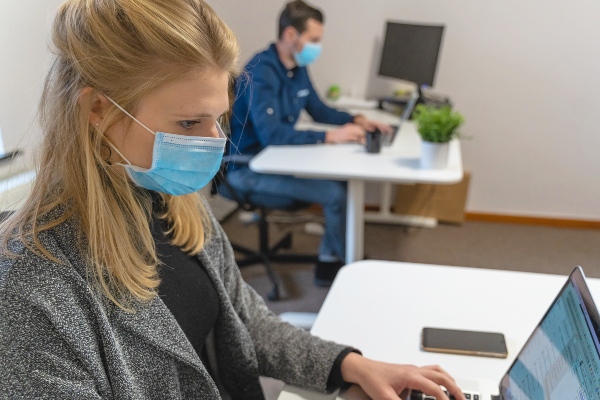The Future of Working Location
The COVID-19 pandemic has had a colossal impact on many areas of our lives, but one of the most profoundly affected has been working location.


The COVID-19 pandemic has had a colossal impact on many areas of our lives, but one of the most profoundly affected has been working location.
Before 2020, many workers across a wide range of industries would never even have considered that they could do their jobs remotely. But nationwide restrictions and health and safety regulations meant that the percentage of people working from home rose sharply from 5.7% to 43.1% in April 2020 once the UK entered a national lockdown, prompting many companies to reassess how their workforce operates (Source).
Home and remote working have been a struggle for many businesses and their employees, but there does now seem to be a light at the end of the tunnel. At present, the UK is set to have lifted all coronavirus restrictions by the 21st of June, and so many employers are now starting to lay plans for welcoming their staff back into the workplace in the coming months.
But what might this mean for the future of the working location? Has the way that we work changed permanently, or will we return to what was once ‘normal’? And how might this affect our clients and candidates in the electronics and embedded systems industry?
Here’s our insight into what the future might hold.

One of the biggest questions affecting the clients that we work with is where candidates are going to want to be working in the future. Now that many people have gotten a taste for working remotely and having more control over their hours and location, candidate expectations may be different and employers will have to consider the flexibility of the contracts they are offering.
A recent study by YouGov revealed that 57% of current British employees want to be able to work from home either full time or some of the time after the pandemic is over. Four in ten of this group had never worked from home before being forced to by COVID-19 restrictions, but now say that they want to continue home working for at least some of the working week (Source).
What these statistics show is that, whilst there is still a reasonable proportion of people who want to return to onsite working as soon as possible, many workers are going to be less keen on commuting to an office or workplace full time. The majority of candidates searching for new roles are going to be more drawn to opportunities that offer flexibility with working location, particularly if the office is a significant distance away from their home.
The IWG Global Workplace Survey identified that 70% of participants agreed that having a choice of working location was a key factor when they evaluated new career opportunities. More than ⅘ would also turn down a job offer that didn’t include flexible working when faced with two similar employment options (Source).
Now that the majority of workers have gotten a taste for remote working, it is likely that this sentiment is even stronger when it comes to job-seeking candidates. Most would agree that working remotely and in the office have their benefits, and so it is this ability to choose and be flexible with their time that is so desirable.
Whilst letting candidates work remotely some or all of the time may be in their best interest, many businesses have had worries about what this might mean for productivity and development. Our ability to virtually deliver training and collaborate on projects has greatly improved after a year of remote work, but does this mean that it’s an adequate replacement for the real thing?
The overall response to this question appears to be yes. Research has shown that the mass move to remote working caused by COVID-19 has only resulted in a 1% decrease in productivity from employees overall, with many people finding that they are more focused and engaged with their work without all the distractions of an office space. (Source)
As well as increased productivity, 81% of remote workers describe their communication with other employees as excellent or good, despite not being able to see them in person. Whilst virtual brainstorming may not feel the same as sitting around a table and collaborating with a team, the overall findings of various studies indicate that work can be carried out just as well when employees are apart (Source).
Remote work is not without its drawbacks however. A study on the state of remote working in 2021 found that loneliness and an inability to unplug outside of ‘office hours’ were two of the biggest struggles for those having to work from home in the past year, with the added stress and worry caused by coronavirus only worsening this (Source).
Employees also reported that they feel their career development has stalled because of having to work remotely because of the pandemic, with 9% believing they have gone backwards in their progress since the start of 2020. Many employers may also feel as though their workforce are less able to develop with the lack of collaboration, mentorship and assessment available with remote working, as well as feeling that teamwork is less effective when that team cannot get together in person to work (Source).
It is too soon yet to be able to say whether remote working has had a real effect on employee performance and development over the past year, and whether this may continue to be an issue if remote or hybrid models of working are taken forward. Overall however, the effect on productivity and efficiency are certainly beneficial, and as we continue to adapt to a new way of working, solutions to common issues are likely to be found.

As highlighted by the data discussed above, feelings about the future of working location are mixed. Whilst many employees have enjoyed working from home and wish to keep the option in the future, there is still a fair percentage who are eager to return to the workplace full time. And whilst there are some benefits to working without the distractions of an office space, in-person collaboration and social interaction have been identified as very important to many employees, meaning that it is unlikely that onsite working will be eradicated for good.
Experts from all over the world are predicting that a hybrid model of working is most likely to be adopted when it comes to working location in the future, with numerous large companies like Google, Microsoft and Amazon already making changes to accommodate this style of working in their offices. When interviewed by the BBC, 86% of businesses said that they are going to implement a mix of remote and office working post-pandemic, where staff are encouraged to work from home for up to three days a week (Source).
Not only will this be more suited to the potential continuation of social distancing rules and limits on how many people can share an indoor space, but it also allows for employees to have more flexibility over their working hours and location whilst still coming into the office for essential tasks or meetings.
Data shows that 72% of current knowledge workers would prefer a hybrid remote-office model when it comes to working location in the future. This means that individual preferences can be accommodated when it comes to what percentage of time employees wish to work remotely and that key training and development tasks can still be carried out in person (Source).
We predict that candidates applying for roles that can be carried out remotely will now be expecting companies to offer this hybrid approach to working, and believe that flexibility and choice is the key to moving forward successfully with a hybrid workforce. The nature of the many roles in the electronics and embedded systems industry means that total remote working is often not possible, but offering your employees a more open and adaptable way of working does have many benefits.
As many employers are likely to have found over the past year, the embedded systems and electronics sectors are not areas of the industry where total remote work is possible. Similar problems have been faced by hospitality, healthcare and social care, and so whilst remote work may be a preferred option for many people, in certain roles it is just not feasible.
Research and development in electronics and embedded systems is a multidisciplinary task, meaning that the majority of companies need to have some staff working onsite in order to be efficient. COVID-19 restrictions may have put limitations on how much of this is possible over the past year, but as the UK starts to open back up again many companies will be seeing a lot of their employees returning to work in person.
The only roles in the industry that are feasible as fully remote involve pure software or developing apps, web servers and databases instead of physical equipment or devices that are being developed or built. Here, employees are likely to benefit from a flexible model that allows them to work remotely without distractions when needed but still come into the office when the job requires.

Depending on their role and area of expertise, some clients and candidates may not find themselves being at all affected by the changes surrounding the working location that we are seeing across the world right now. Others may be having to rapidly rethink and develop their approach to the workspace and consider where their priorities lie concerning what needs to be done in person and what can continue to be done online.
The key to navigating the future of the working location is flexibility, both in the model you apply and your attitude towards the preferences of your staff or employer. Hybrid models of work are predicted and favoured by many, but what these actually look like will differ between businesses, along with how you choose to make them work for you.
The future of recruiting has been massively impacted by the COVID-19 pandemic. If you’d like the help of an expert in recruitment in the electronics and embedded systems industry, get in touch and let us know how we can help.

 These Are The Most Popular Songs To Code To
These Are The Most Popular Songs To Code To